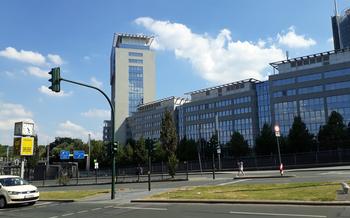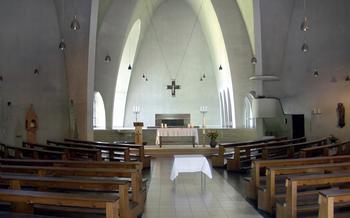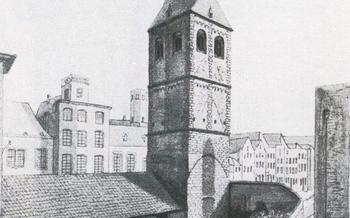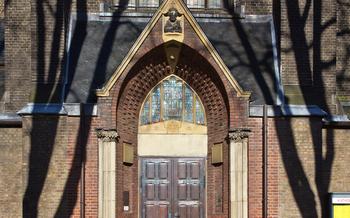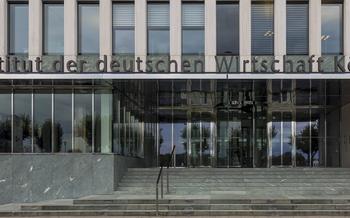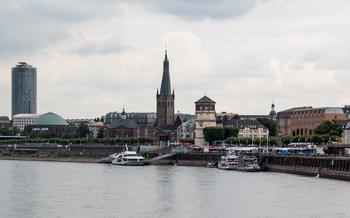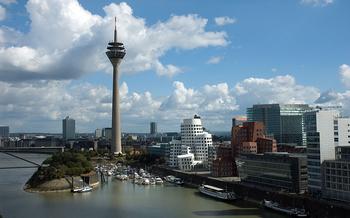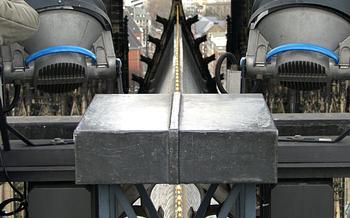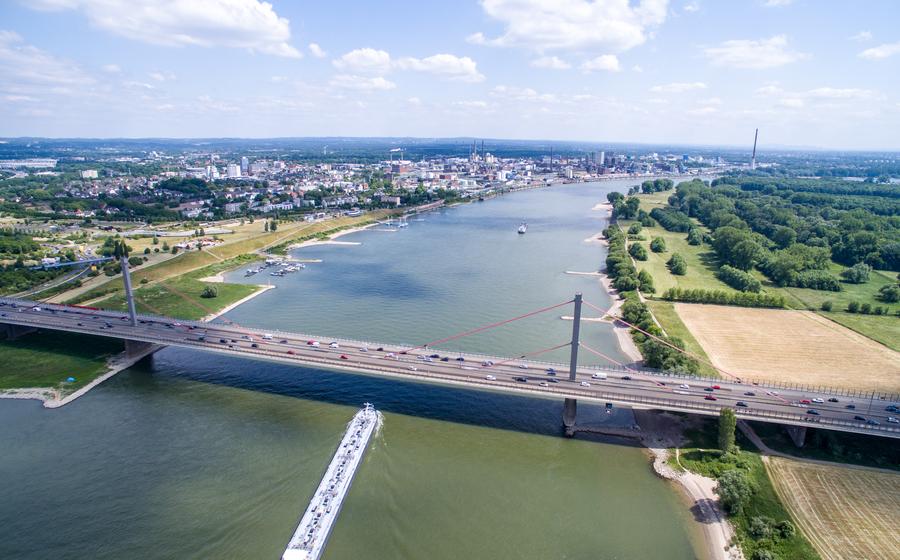
Deutsches Klingenmuseum, Solingen
- The Deutsches Klingenmuseum in Solingen: A Haven for Blade Enthusiasts
- Exploring the Museum's Diverse Collections
- Witnessing the Art of Blade Making
- Unveiling the History of Blades in Solingen
- Immersive Experiences for Visitors
- Delving into the Science of Blades
- Celebrating Blade Culture and Craftsmanship
- Shopping for Unique Blades and Souvenirs
- Planning Your Visit to the Deutsches Klingenmuseum
- Enhancing Your Museum Experience
- Beyond the Museum: Exploring Solingen
- Uncovering the Secrets of the Sword
- The Allure of Damascus Steel
- Honoring the Masters of the Blade
- Insider Tip: Exploring Hidden Gems
The Deutsches Klingenmuseum in Solingen: A Haven for Blade Enthusiasts
Nested in the heart of Solingen, a city renowned for its rich blade-making heritage, the Deutsches Klingenmuseum stands as a testament to the art and science of bladesmithing. This extraordinary museum houses a treasure trove of swords, knives, and other bladed objects, spanning centuries of history and cultures.
Established in 1994, the Deutsches Klingenmuseum has become a pilgrimage site for blade enthusiasts worldwide. Its extensive collection, interactive exhibits, and live demonstrations offer a captivating journey into the world of blades, unveiling their historical significance, cultural impact, and intricate craftsmanship.
Beyond its role as a repository of bladed artifacts, the museum serves as a vital center for research, education, and preservation. Through collaborations with universities and research institutions, the Deutsches Klingenmuseum actively contributes to the advancement of blade-making knowledge and techniques, ensuring that this ancient craft continues to thrive in the modern era.
Exploring the Museum's Diverse Collections
The Deutsches Klingenmuseum in Solingen boasts a diverse collection of blades, cutlery, and related objects, organized into various sections and galleries. Each section offers a unique perspective on the history, craftsmanship, and cultural significance of blades.
Cutlery Collection: This section showcases an array of knives, scissors, and other cutting tools from around the world. Visitors can explore the evolution of cutlery design and the different materials and techniques used in their production.
Swordsmithing Collection: Dedicated to the art of sword making, this section features an impressive array of swords from different eras and cultures. From ancient Roman gladii to intricate Japanese katanas, the collection offers a glimpse into the diverse styles and techniques of swordsmithing.
Damascus Steel Collection: One of the highlights of the museum is its collection of Damascus steel blades. Renowned for their unique patterns and exceptional sharpness, these blades are considered among the finest examples of metalworking craftsmanship. The museum's collection includes both historical and contemporary Damascus steel blades, providing visitors with a comprehensive overview of this legendary material.
In addition to the permanent collections, the museum also hosts special exhibitions and temporary displays that focus on specific aspects of blade making and culture. These exhibitions often feature rare and unique pieces from private collections and offer visitors a chance to explore different themes in depth.
The Deutsches Klingenmuseum's commitment to research and conservation ensures that its collections are not only preserved but also studied and shared with the public. The museum collaborates with universities and research institutions to conduct scientific studies on the properties of steel and blade design. This research helps to advance the understanding of blade making and contributes to the preservation of traditional techniques.
Witnessing the Art of Blade Making
The Deutsches Klingenmuseum offers visitors a unique opportunity to witness the art of blade making firsthand. Through live demonstrations by skilled craftsmen, visitors can observe the techniques and processes involved in forging, grinding, and polishing blades. These skilled artisans demonstrate the traditional methods that have been passed down through generations, showcasing the intricate craftsmanship and precision required to create these exceptional blades.
Experienced blade makers share their knowledge and expertise, providing insights into the art of blade making and the challenges they face. Visitors can watch as these craftsmen transform raw materials into beautiful and functional blades, using a variety of tools and techniques. The demonstrations highlight the importance of precision, patience, and skill required to create a quality blade.
The museum also offers workshops and classes for aspiring blade makers, providing them with the opportunity to learn from the masters and gain hands-on experience in the craft. These workshops cover various aspects of blade making, from basic forging techniques to advanced finishing and polishing skills. Participants can create their own blades under the guidance of experienced instructors, taking home a unique souvenir and a newfound appreciation for the art of blade making.
Unveiling the History of Blades in Solingen
Solingen's rich history as a center of blade production dates back to the Middle Ages when the city's geographical location and access to natural resources, such as iron ore and water, made it an ideal place for forging blades. The guilds and trade associations that emerged during this period played a significant role in regulating the production and quality of blades, establishing strict standards and apprenticeship systems.
The industrial revolution brought about significant changes to the blade-making industry in Solingen. Mechanization and new technologies, such as steam hammers and power-driven grinding machines, transformed the production process, enabling mass production while maintaining the high standards of craftsmanship. Despite these advancements, traditional methods, such as hand-forging and polishing, continued to be used for specialized blades and custom orders.
Solingen's reputation for quality and craftsmanship earned it a global reputation, and its blades became sought after by armies, adventurers, and collectors worldwide. The city's swordsmiths and cutlery makers were renowned for their skill and attention to detail, and their products were considered among the finest in the world. This reputation has endured to this day, with Solingen remaining a leading center for blade production, known for its high-quality knives, scissors, and other cutting tools.
Immersive Experiences for Visitors
The Deutsches Klingenmuseum offers a plethora of interactive exhibits that engage all senses and bring the world of blades to life. Visitors can immerse themselves in the captivating history and craftsmanship of blades through multimedia presentations and audio guides. Hands-on activities for children and families allow them to explore the science and art of blade making in a fun and interactive way.
The museum also hosts thematic events and festivals throughout the year, celebrating the rich culture and heritage of blades. These events provide a unique opportunity to witness live demonstrations by skilled craftsmen, participate in workshops, and engage with the vibrant community of blade enthusiasts.
Delving into the Science of Blades
The Deutsches Klingenmuseum is not merely a repository of historic blades; it is also a hub for scientific research and innovation. The museum collaborates with universities, research institutions, and blade makers to explore the science behind blade design and performance. Scientists study the properties of steel, analyze blade geometry, and conduct experiments to understand how blades behave under various conditions.
This research contributes to the preservation and advancement of traditional blade-making techniques. By understanding the science behind the craft, contemporary blade makers can refine their methods, improve the quality of their products, and create new and innovative designs. The museum also conducts testing and evaluation of blades for various applications, including cutlery, surgical instruments, and industrial tools. This research helps ensure that blades are safe, effective, and meet the specific requirements of their intended use.
The Deutsches Klingenmuseum's commitment to scientific research demonstrates its dedication to preserving and promoting the art and science of blade making. By fostering collaboration between researchers and artisans, the museum plays a vital role in ensuring that this ancient craft continues to thrive in the modern world.
Celebrating Blade Culture and Craftsmanship
The Deutsches Klingenmuseum is not just a repository of blades; it is a vibrant hub where the culture and craftsmanship of blade making are celebrated. Solingen's rich heritage in this field has earned it the recognition of UNESCO as an Intangible Cultural Heritage. This prestigious designation highlights the exceptional skills and knowledge that have been passed down through generations of Solingen's blade makers.
International competitions and awards further showcase the city's dedication to excellence in blade making. These events bring together the world's finest craftsmen, who compete to create the most exquisite and innovative blades. The museum proudly displays the winning entries, providing visitors with a glimpse into the cutting-edge of contemporary blade making.
Exhibitions and events throughout the year provide a platform for contemporary blade makers to showcase their skills and artistry. These events offer visitors the chance to meet the makers in person, learn about their techniques, and witness their passion for their craft. The museum also hosts workshops and demonstrations, allowing visitors to experience the art of blade making firsthand.
The vibrant community of blade enthusiasts who gather at the Deutsches Klingenmuseum is a testament to the enduring fascination with blades. These enthusiasts share a deep appreciation for the history, craftsmanship, and beauty of blades. Whether they are collectors, makers, or simply admirers, they find a welcoming and supportive community at the museum.
Together, the Deutsches Klingenmuseum and the city of Solingen celebrate the rich tradition of blade making, honoring the legacy of the past while embracing the innovations of the present. This celebration of blade culture ensures that the skills and knowledge of Solingen's master blade makers will continue to be passed down to future generations, preserving this unique and valuable craft for years to come.
Shopping for Unique Blades and Souvenirs
The Deutsches Klingenmuseum offers a unique opportunity to purchase high-quality blades, cutlery, and accessories. The museum shop stocks a wide range of items, from traditional pocket knives to elegant swords and decorative daggers. Visitors can also find limited-edition and custom-made pieces that make for exceptional souvenirs.
For a truly unique experience, consider purchasing a blade directly from a local artisan. The museum collaborates with skilled craftsmen and women who demonstrate their skills at live demonstrations. Visitors can interact with these artisans, learn about their techniques, and purchase their one-of-a-kind creations.
Whether you're looking for a practical tool, a decorative piece, or a special gift, the Deutsches Klingenmuseum shop has something for everyone. Take your time browsing the selection, and don't hesitate to ask the friendly staff for assistance.
Here are some tips for finding the perfect souvenir:
- Consider your budget and the intended use of the blade.
- Look for items that are well-crafted and made from high-quality materials.
- If you're purchasing a knife, check the sharpness and durability of the blade.
- Consider the aesthetic appeal of the blade and its handle.
- Don't forget to ask about care and maintenance instructions.
- If you're buying a gift, consider the recipient's interests and preferences.
Planning Your Visit to the Deutsches Klingenmuseum
The Deutsches Klingenmuseum is conveniently located in the heart of Solingen, a city renowned for its rich history in blade production. The museum is easily accessible by public transportation, with bus stops and train stations within a short walking distance. For those arriving by car, there are ample parking options nearby, including both paid and free parking zones.
The museum's opening hours are from Tuesday to Sunday, from 10 am to 5 pm. Admission fees are reasonable, with discounts available for students, seniors, and families. To enhance your visit, guided tours are offered in German and English, providing a deeper insight into the museum's exhibits and collections. Reservations for guided tours can be made in advance online or by phone.
For a comfortable and enriching experience, the museum offers various facilities and amenities to its visitors. The museum shop is a treasure trove of unique blades, cutlery, and accessories, making it the perfect place to find souvenirs and gifts. Lockers are available for storing personal belongings, and there are restrooms and a café on-site for visitors' convenience. The museum is also wheelchair accessible, ensuring an inclusive and enjoyable visit for all.
Enhancing Your Museum Experience
To make the most of your visit to the Deutsches Klingenmuseum, consider the following tips:
-
Plan Your Route: Create an itinerary based on your interests, whether it's specific exhibits, live demonstrations, or interactive activities.
-
Guided Tours: Take advantage of guided tours led by knowledgeable museum staff to gain deeper insights into the history and significance of the exhibits.
-
Photography and Social Media: Capture your visit through photos, but be mindful of any restrictions on photography in certain areas. Share your experience on social media using the museum's designated hashtags.
-
Accessibility: The museum is committed to inclusivity. If you have any accessibility requirements, inform the staff, who will gladly assist you.
-
Stay Hydrated and Refreshed: The museum offers a café where you can grab a snack or drink to refuel during your visit.
-
Embrace the Museum Shop: Don't miss the museum shop, which offers a treasure trove of unique blades, cutlery, and souvenirs. You may even find limited-edition or custom-made items not available elsewhere.
Beyond the Museum: Exploring Solingen
The Deutsches Klingenmuseum is not the only attraction that Solingen has to offer. The city boasts a rich history, vibrant culture, and stunning natural beauty, inviting visitors to explore beyond the museum walls.
Take a leisurely stroll through the city center and admire the historic buildings, charming squares, and lively pedestrian zones. Visit the Solingen City Museum to learn about the city's fascinating past, from its humble beginnings as a small village to its rise as a global center of blade production.
For a breath of fresh air, head to one of Solingen's many parks and gardens. The Botanischer Garten Solingen offers a peaceful oasis with a diverse collection of plants, while the Stadtpark Solingen features a beautiful rose garden, a playground, and a miniature golf course.
Indulge in some retail therapy at the numerous shops and boutiques in Solingen. From high-end fashion stores to traditional cutlery shops, there's something for every taste and budget. Be sure to pick up some Solingen-made cutlery or knives as a souvenir of your visit.
When it comes to dining, Solingen has a culinary scene that is as diverse as its people. From traditional German cuisine to international flavors, there are restaurants to suit every palate. Don't miss the chance to try some of the local specialties, such as the Bergische Kaffeetafel, a traditional afternoon coffee and cake spread.
For a day trip, consider visiting the nearby cities of Cologne, Düsseldorf, or Essen, each with its own unique attractions and cultural offerings. Take a boat trip along the Rhine River, explore the historic Old Town of Düsseldorf, or visit the Ruhr Museum in Essen, which showcases the region's industrial heritage.
Whether you're a history buff, a nature lover, or a shopping enthusiast, Solingen has something to offer everyone. So, after immersing yourself in the world of blades at the Deutsches Klingenmuseum, take some time to explore the city and discover its many hidden gems.
Uncovering the Secrets of the Sword
The Deutsches Klingenmuseum houses an impressive collection of swords from different eras and cultures, providing a glimpse into the evolution of this iconic weapon. From ancient Greek xiphos to medieval knightly swords and ornate Japanese katanas, the museum's curators have carefully assembled a diverse array of blades that showcase the skill and artistry of swordsmiths across the globe.
Visitors can marvel at the intricate details and craftsmanship of these deadly works of art, each telling a story of its time and place. Learn about the different types of swords, their intended uses, and the symbolism and cultural significance they held for their wielders.
Whether you're a history buff, a collector, or simply fascinated by the allure of the sword, the Deutsches Klingenmuseum's collection offers a unique opportunity to explore the rich history and traditions of this timeless weapon.
The Allure of Damascus Steel
Damascus steel, with its distinctive patterns and legendary properties, holds a captivating allure for blade enthusiasts worldwide. The Deutsches Klingenmuseum houses a remarkable collection of Damascus steel blades, offering visitors a glimpse into the history, science, and artistry of this extraordinary material.
The museum's collection includes examples of Damascus steel from various regions and eras, showcasing the diverse techniques and styles employed by skilled bladesmiths throughout history. Visitors can marvel at the intricate patterns, known as "damascus," created by the forging and folding of different types of steel. These patterns, reminiscent of flowing water or swirling clouds, are not merely aesthetic but also contribute to the blade's strength and resilience.
One of the most intriguing aspects of Damascus steel is its enduring mystique. Legends and tales have surrounded this material for centuries, attributing it with supernatural powers and unmatched sharpness. While modern science has demystified some of these claims, the allure of Damascus steel persists.
Contemporary Damascus steel makers continue to honor and innovate upon this ancient tradition. The museum features works by contemporary masters who employ traditional techniques and forge Damascus steel blades with exceptional craftsmanship. Visitors can witness the intricate process of forging, folding, and pattern welding, gaining insights into the skill and patience required to create these remarkable blades.
Honoring the Masters of the Blade
The Deutsches Klingenmuseum pays homage to the extraordinary individuals who have shaped the art of blade making in Solingen and beyond. Among them are master swordsmiths whose skills and artistry have earned them worldwide recognition. Their contributions to the craft have not only preserved traditional techniques but also pushed the boundaries of innovation and design.
One such master is Willi Becker, whose Damascus steel creations are renowned for their exceptional quality and intricate patterns. His dedication to his craft and his tireless pursuit of perfection have made him a legend in the blade-making world.
Another notable figure is Manfred Sachse, a master swordsmith who has dedicated his life to preserving the art of historical sword making. His meticulous attention to detail and his deep understanding of historical techniques have earned him a reputation as one of the world's leading experts in this field.
These master blade makers represent the spirit of excellence and innovation that has defined Solingen's blade-making tradition for centuries. Their work continues to inspire and captivate, serving as a testament to the enduring power of human creativity and craftsmanship.
Insider Tip: Exploring Hidden Gems
Beyond the main exhibits, the Deutsches Klingenmuseum holds a treasure trove of hidden gems waiting to be discovered. In the basement, you'll find a fascinating collection of medieval swords, some dating back to the 13th century. These blades offer a glimpse into the martial history of Europe, with their intricate designs and well-preserved condition.
Look out for special events and workshops held throughout the year. These events provide a unique opportunity to learn from master blade makers, witness live demonstrations, and even try your hand at forging your own blade. The museum staff is incredibly knowledgeable and passionate about their work, so don't hesitate to engage them in conversation. They'll be delighted to share their insights and recommendations, helping you uncover the hidden secrets of the Deutsches Klingenmuseum.
